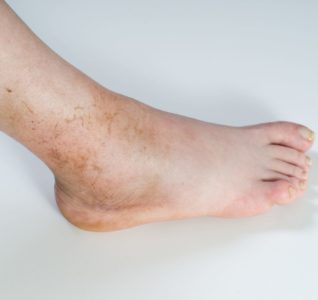 Your ankles usually swell when they suffer trauma like a sprain or a fracture, but as you age, they can swell for other reasons. Some of these problems should be monitored while you take corrective actions, while others are more serious causes for concern. So today, we take a look at some reasons why senior citizens may be dealing with swollen ankles, and how they should be treated?
Your ankles usually swell when they suffer trauma like a sprain or a fracture, but as you age, they can swell for other reasons. Some of these problems should be monitored while you take corrective actions, while others are more serious causes for concern. So today, we take a look at some reasons why senior citizens may be dealing with swollen ankles, and how they should be treated?
Why Are My Ankles Swollen?
Aside from acute trauma, here are a few reasons why senior citizens may be dealing with swollen ankles and feet:
Lymphedema – Lympathic vessels carry white blood cell filled-fluid to the heart and other areas of the body to help prevent against infection. If fluid flow is blocked or circulation is poor, it can lead to swelling in various body parts, including the ankles.
Gout – Gout is a problem that is characterized by uric acid accumulation in the joints of the foot, which causes inflammation, pain and swelling. Dietary choices and lack of exercise can lead to the onset of gout.
Arthritis – Your joints will slowly degenerate over the years, and after enough degeneration, this can lead to arthritis of the joint. Ankle or foot arthritis can cause symptoms of pain, swelling and joint stiffness.
Deep Vein Thrombosis – DVT is caused by a blood clot in your legs. They can cause your feet to swell, and they should be treated as soon as possible because the clot can move and lodge elsewhere, causing even more problems.
Trauma – As we touched upon in the intro, acute trauma to the foot or ankle will lead to blood pooling and a natural injury response, which includes localized swelling.
Treating Swollen Ankles In The Elderly
Here are some tips for treating your swollen ankles:
- Exercise – Exercise can help to improve circulation in your feet, which can help to alleviate swelling. It can also help if the swelling is being caused by gout, because it can work to remove the uric acid buildup from your joints.
- Movement – If exercise isn’t easy, simply moving a bit at regular intervals can help. Standing or sitting for long periods can contribute to swelling, so avoid staying in one position for long periods of time.
- Elevation – Elevating your feet can help the excess fluid move out of the ankle area.
- Ice – If acute injury is the cause of your swelling, ice and compression can help to limit the onset of swelling.
- Talk To A Doctor – If your foot swelling seems to come out of nowhere, or it isn’t resolving by the above treatments, set up a meeting with a foot and ankle specialist. We can determine what is causing the swelling and the best ways to treat it.